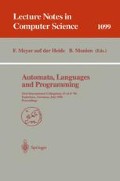Abstract
We address the question of how one evaluates the usefulness of a heuristic program on a particular input. If theoretical tools do not allow us to decide for every instance whether a particular heuristic is fast enough, might we at least write a simple, fast companion program that makes this decision on some inputs of interest? We call such a companion program a timer for the heuristic. Timers are related to program checkers, as defined by Blum [3], in the following sense: Checkers are companion programs that check the correctness of the output produced by (unproven but bounded-time) programs on particular instances; timers, on the other hand, are companion programs that attempt to bound the running time on particular instances of correct programs whose running times have not been fully analyzed. This paper provides a family of definitions that formalize the notion of a timer and some preliminary results that demonstrate the utility of these definitions.
Most of this work first appeared in an AT&T Bell Laboratories Technical Memorandum on December 1, 1994.
Supported in part by an NSF Mathematical Sciences Postdoctoral Fellowship and a consulting agreement with AT&T Bell Laboratories.
Preview
Unable to display preview. Download preview PDF.
References
L. Adleman and M. Huang, Recognizing primes in random polynomial time, in Proc. 19th Symposium on Theory of Computing, ACM, New York, 1987, pp. 462–469.
L. Babai, L. Fortnow, and C. Lund, Nondeterministic exponential time has two-prover interactive protocols, Computational Complexity, 1 (1991) 3–40.
M. Blum, Program result checking: a new approach to making programs more reliable, in Proc. 20th International Colloquium on Automata, Languages, and Programming, Lecture Notes in Computer Science, vol. 700, Springer, Berlin, 1993, pp. 2–14. First appeared in preliminary form in report 88-009, International Computer Science Institute Technical, Berkeley CA, 1988.
L. Goldberg, Efficient Algorithms for Listing Combinatorial Structures, Cambridge University Press, Cambridge UK, 1993.
S. Goldwasser and S. Micali, Probabilistic encryption, J. Comput. and Sys. Scis., 28 (1984) 270–299.
J. Grollman and A. Selman, Complexity measures for public-key cryptosystems, SIAM J. Comput., 17 (1988) 309–335.
J. Gustedt and A. Steger, Testing hereditary properties efficiently on average, in Proc. of ORDAL '94.
J. Hastad, Pseudo-random generators under uniform assumptions, in Proc. 22nd Symposium on the Theory of Computing, ACM, New York, 1990, pp. 395–404.
R. Impagliazzo, L. Levin, and M. Luby, Pseudo-random generation from one-way functions, in Proc. 21st Symposium on the Theory of Computing, ACM, New York, 1989, pp. 12–24.
M. Jerrum and A. Sinclair, Approximating the permanent, SIAM J. Comput., 18 (1989) 1149–1178.
D. Johnson, C. Papadimitriou, and M. Yannakakis, On generating all maximal independent sets, Inf. Proc. Letters, 27 (1988) 119–123.
G. Kirchoff, Uber die Auflosung der Gleichungen, auf welche man bei der Untersuchung der linearen Verteilung galvanische Strome gefuhrt wird, Ann. Phys. Chem., 72 (1847) 497–508.
D. Knuth, Sorting and Searching, The Art of Computer Programming, vol. 3, Addison-Wesley, Reading, 1973.
K. Ko, T. Long, and D. Du, On one-way functions and polynomial-time isomorphisms, Theor. Comp. Sci., 47 (1986) 263–276.
C. Lund, L. Fortnow, H. Karloff, and N. Nisan, Algebraic methods for interactive proof systems, J. ACM, 39 (1992) 859–868.
J.R. Munkres, Topology: A First Course, Prentice-Hall, Englewood Cliffs, 1975.
R. Read and R. Tarjan, Bounds on backtrack algorithms for listing cycles, paths, and spanning trees, Networks, 5 (1975) 237–252.
A. Shamir, IP = PSPACE, J. ACM, 39 (1992) 869–877.
L. Valiant, The complexity of computing the permanent, Theor. Comp. Sci., 8 (1979) 189–201.
L. Valiant, Negative results on counting, in Proc. 4th Theoretical Computer Science GI Conference, Lecture Notes in Computer Science, vol. 67, 1979, Springer, Berlin, pp. 40–45.
Author information
Authors and Affiliations
Editor information
Rights and permissions
Copyright information
© 1996 Springer-Verlag Berlin Heidelberg
About this paper
Cite this paper
Cowen, L., Feigenbaum, J., Kannan, S. (1996). A formal framework for evaluating heuristic programs. In: Meyer, F., Monien, B. (eds) Automata, Languages and Programming. ICALP 1996. Lecture Notes in Computer Science, vol 1099. Springer, Berlin, Heidelberg. https://doi.org/10.1007/3-540-61440-0_165
Download citation
DOI: https://doi.org/10.1007/3-540-61440-0_165
Published:
Publisher Name: Springer, Berlin, Heidelberg
Print ISBN: 978-3-540-61440-1
Online ISBN: 978-3-540-68580-7
eBook Packages: Springer Book Archive

